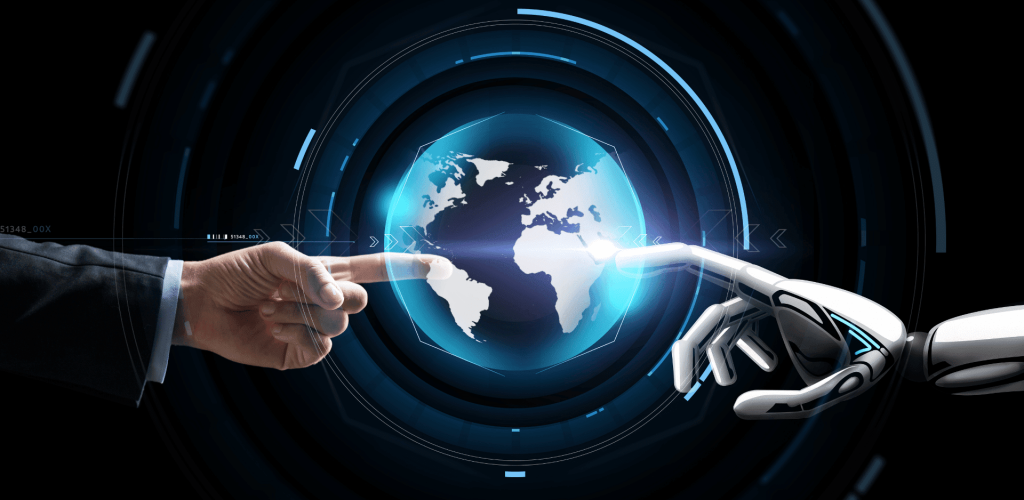
How AI is Changing Our Everyday Lives
Artificial Intelligence (AI) is no longer something we only see in science fiction movies — it’s a real, growing part of our daily lives. From the moment we wake up to the time we go to sleep, AI technology is silently working behind the scenes to make our lives easier, faster, and more personalized.
Let’s dive into how AI is transforming everyday activities you might not even realize!

AI in Smartphones
Our smartphones are filled with AI-driven features:
Voice Assistants: Tools like Siri, Google Assistant, and Alexa help us set reminders, check the weather, or even control smart home devices — just by talking.
Camera Enhancements: AI improves photo quality automatically by adjusting lighting, detecting faces, and even removing unwanted objects.
Predictive Text and Smart Replies: AI helps suggest words and responses while texting, saving us time and making communication smoother.
Example:
When you unlock your phone using facial recognition, you’re using AI.
AI in Social Media
Social media platforms heavily rely on AI to improve user experience:
Content Recommendations: Instagram, TikTok, YouTube, and Facebook suggest videos and posts based on your interests.
Photo Tagging: Facebook uses AI to recognize faces and suggest friends to tag.
Moderation: AI filters out harmful or inappropriate content automatically.
Example:
The “For You” page on TikTok is curated entirely by AI analyzing your behavior.
AI in Online Shopping
AI has revolutionized how we shop online:
Product Recommendations: Amazon and Flipkart suggest items based on your browsing history and purchases.
Chatbots for Customer Service: AI-powered chatbots answer customer queries instantly.
Virtual Try-Ons: Some fashion and makeup brands use AI to let you “try on” products virtually before buying.
Example:
When you see a “You might also like” section on an e-commerce site, that’s AI at work.
AI in Healthcare
AI is transforming the healthcare industry:
Diagnosis and Imaging: AI tools help doctors detect diseases like cancer more accurately and earlier.
Health Monitoring: Smartwatches like Apple Watch monitor heart rates, blood oxygen levels, and alert users to potential health issues.
Virtual Health Assistants: Apps like Ada Health use AI to analyze symptoms and recommend actions.
Example:
AI algorithms can now read X-rays and MRI scans faster than human doctors in many cases.
AI in Transportation
From navigation apps to self-driving cars, AI plays a major role in how we move around:
Navigation Systems: Google Maps uses AI to predict traffic and suggest faster routes.
Ride-Sharing Apps: Uber and Lyft use AI to match drivers with passengers and optimize routes.
Autonomous Vehicles: Companies like Tesla and Waymo are pushing forward self-driving car technology using advanced AI.
Example:
When your GPS reroutes you around heavy traffic, that’s AI helping you save time.
AI in Home Automation
Smart homes are becoming more common thanks to AI:
Smart Speakers: Devices like Amazon Echo and Google Nest control lights, thermostats, and even security systems through simple voice commands.
Security Systems: AI-powered cameras can recognize faces and detect suspicious activities.
Example:
A smart thermostat learns your schedule and adjusts the temperature to save energy — without you even thinking about it.
AI in Entertainment
Entertainment experiences are now personalized:
Streaming Services: Netflix, Disney+, and Spotify recommend shows, movies, and songs you might love based on your previous choices.
Gaming: AI opponents in video games learn and adapt to player strategies for more challenging gameplay.
Example:
The “Recommended for You” section on Netflix is powered by AI.
AI in Education
AI is reshaping how we learn:
Personalized Learning: Platforms like Duolingo use AI to adapt lessons based on your progress.
Tutoring and Assistance: AI tutors help students in subjects like math, science, and languages.
Essay Grading: Some schools use AI systems to grade assignments and provide feedback.
Example:
AI chatbots are helping students practice conversational skills in new languages.
The Future: Even More AI Integration
As AI continues to evolve, we can expect even deeper integration into areas like:
Smart cities
Advanced healthcare diagnostics
AI companions and personal assistants
Smarter energy management
While AI makes life more convenient, it’s also important to consider ethical issues like privacy, data protection, and fairness to ensure AI benefits everyone.
Final Thoughts
Artificial Intelligence has quietly woven itself into nearly every part of our daily lives. From simple tasks like checking the weather to complex ones like detecting diseases, AI is helping us live smarter, healthier, and more efficient lives.
By understanding how AI impacts us today, we can better prepare ourselves for the innovations and changes it will bring tomorrow.
FAQs About AI in Daily Life
Q1: Is AI taking over human jobs?
AI is automating some tasks but also creating new jobs in tech, healthcare, education, and creative industries.
Q2: How secure is AI technology?
While AI improves security, it also introduces risks. Ensuring proper cybersecurity and ethical use of AI is critical.
Q3: Do I interact with AI every day?
Yes! Every time you use your smartphone, social media, online shopping, or navigation apps, you’re interacting with AI.
